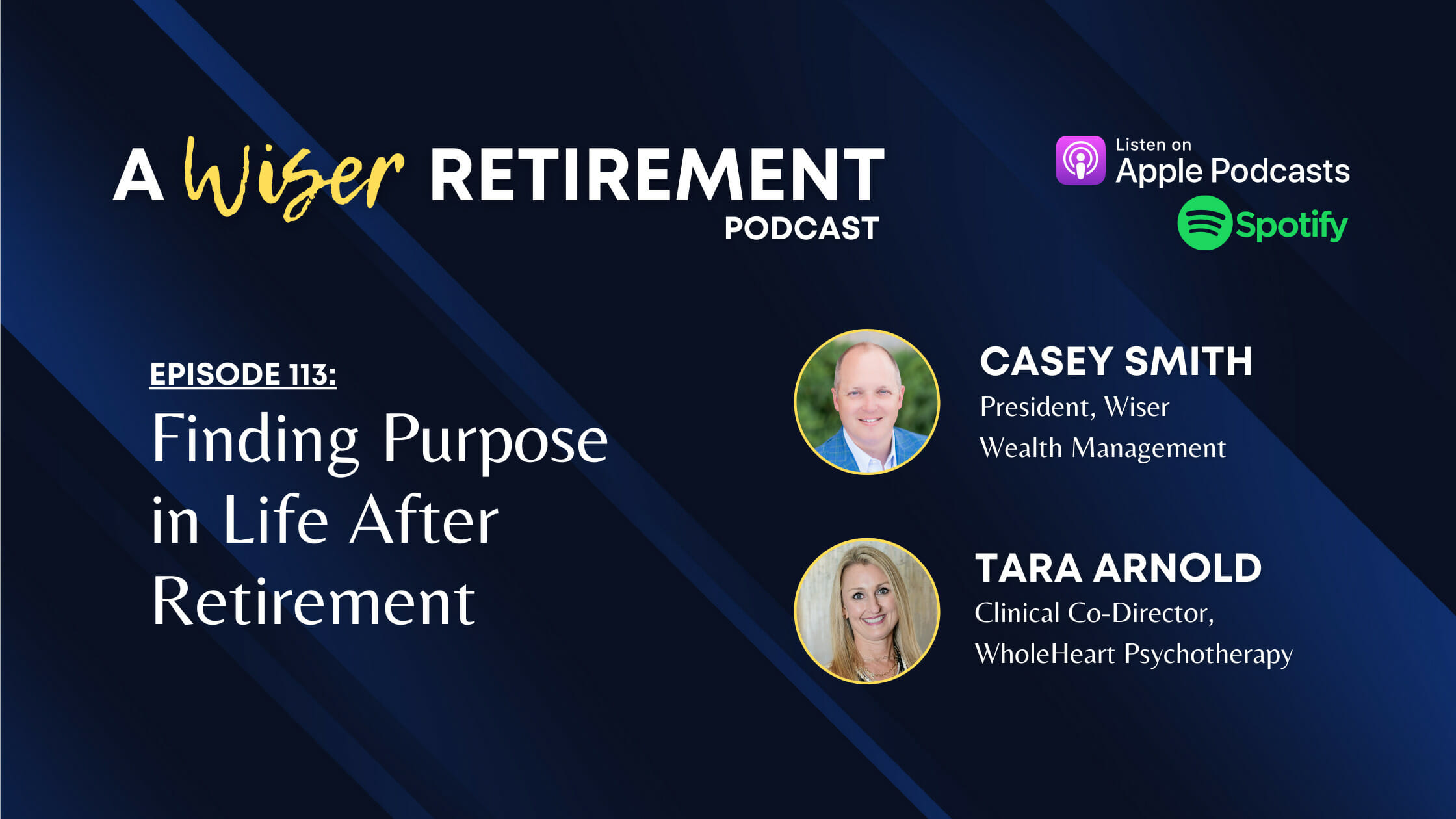
Finding Purpose in Life After Retirement
On this episode of A Wiser Retirement Podcast, Casey Smith introduces special guest, Tara Arnold, PhD, LCSW, CEDS-S, RYT-200, Clinical Co-Director of WholeHeart Psychotherapy. Dr. Arnold talks about how to find purpose in life after retirement. She also discusses marriage in retirement, signs of depression, mindfulness, and depression and anxiety management. It is important to build a psychological retirement portfolio so you can prioritize your mental health in retirement.
Listen on Apple Podcasts or watch on YouTube:
SUMMARY:
Building a Psychological Retirement Portfolio
More often than not, people think retirement will be easy. However, retirees quickly conclude it is not. Retirement needs to be planned for financially and psychologically. The best way to do this is by building a psychological retirement portfolio. This will help you cope with the emotional side of retirement and create a new sense of identity. A great way to begin this process is by identifying your hobbies, passions, friendships, and financial budget.
Marriage in Retirement
The start of retirement can be a beautiful opportunity to redefine your relationship. After you retire, you will most likely be spending more time with your spouse. Because of this, it is important to set boundaries and expectations with your spouse before retirement. Start the conversation early to talk about your hopes and dreams for retirement. It is important to be honest and communicate what each person needs to be happy.
The Sugar Rush Effect
In retirement, sometimes retirees deal with something called the sugar rush effect. In the beginning stages of retirement, most retirees are very happy because they can enjoy traveling, golfing, and other hobbies. However, there can be a significant drop in emotional well-being for some people because those activities may not provide the same sense of purpose. To avoid the sugar rush effect, have a plan for the psychological ups and downs of retirement.
Signs of Depression in Retirement
There are a few signs of depression to watch for in retirement. The most common signs of depression in retirement include a disinterest in previously enjoyed activities, self-isolation, worries about the future, and negative thoughts. A good way to avoid these feelings is to think about what you have to gain in retirement versus what you have to lose. It is important to find a new sense of purpose after retirement so you can avoid these feelings of depression.
Finding Your Purpose in Retirement
Start by gathering insight into who you are. Ask yourself: What is important to me? What do I enjoy? Answering these questions will help create a pathway for yourself. For example, if you enjoy working with animals, volunteer at an animal shelter. You could also involve yourself in the community or even start your own business. Make sure to have a plan for each day. Try to fit in self-care, exercise, and time for hobbies. This will enable you to find purpose in retirement.
Set Healthy Boundaries
Being invested in your family is a wonderful thing. However, it is important to set healthy boundaries with your loved ones. Start by having a conversation with your family about your concerns. This will allow for understanding and a healthy start to open communication.
The Importance of Mindfulness
There can be many ups and downs in retirement. Three ways to practice mindfulness in retirement are to be deliberate in which activities you choose to participate in, stay engaged, and be physically active. Find which activities will be best for you by asking other people what they like to do. This could give you an idea of what’s out there. You could also receive counseling for help with finding which activities might be right for you.
Depression and Anxiety Management
If you are experiencing depression or anxiety, it is important to find anxiety reduction techniques that work for you. A few ways to manage depression or anxiety include meditation, relaxation techniques, gratitude practice, and physical activity. Overall, these practices can have a positive effect on your mental health and well-being.
Download our white paper on “Your Pre-Retirement Checklist”
TIMESTAMPS:
0:00 Intro
2:49 Building a Psychological Retirement Portfolio
8:34 or 17:17 Marriage in Retirement
9:48 The Sugar Rush Effect
11:27 Signs of Depression in Retirement
13:38 or 21:45 Finding Your Purpose
23:57 Set Healthy Boundaries
26:24 The Importance of Mindfulness
31:51 Depression and Anxiety Management
SOURCES:
LINKS:
Learn more about Tara Arnold.
Learn more about Casey Smith and connect with him on Twitter.
Learn more about Brad Lyons.
Learn more about Matthews Barnett.
CONNECT:
Twitter, Instagram, Facebook, LinkedIn, and YouTube.
Learn more about A Wiser Retirement podcast and access previous episodes.
Share This Story, Choose Your Platform!
Wiser Wealth Management, Inc (“Wiser Wealth”) is a registered investment adviser with the U.S. Securities and Exchange Commission (SEC). As a registered investment adviser, Wiser Wealth and its employees are subject to various rules, filings, and requirements. You can visit the SEC’s website here to obtain further information on our firm or investment adviser’s registration.
Wiser Wealth’s website provides general information regarding our business along with access to additional investment related information, various financial calculators, and external / third party links. Material presented on this website is believed to be from reliable sources and is meant for informational purposes only. Wiser Wealth does not endorse or accept responsibility for the content of any third-party website and is not affiliated with any third-party website or social media page. Wiser Wealth does not expressly or implicitly adopt or endorse any of the expressions, opinions or content posted by third party websites or on social media pages. While Wiser Wealth uses reasonable efforts to obtain information from sources it believes to be reliable, we make no representation that the information or opinions contained in our publications are accurate, reliable, or complete.
To the extent that you utilize any financial calculators or links in our website, you acknowledge and understand that the information provided to you should not be construed as personal investment advice from Wiser Wealth or any of its investment professionals. Advice provided by Wiser Wealth is given only within the context of our contractual agreement with the client. Wiser Wealth does not offer legal, accounting or tax advice. Consult your own attorney, accountant, and other professionals for these services.






